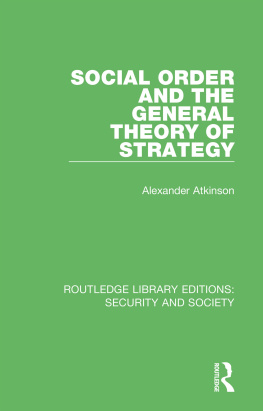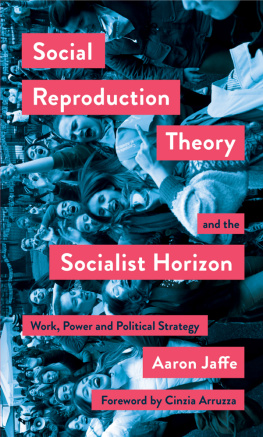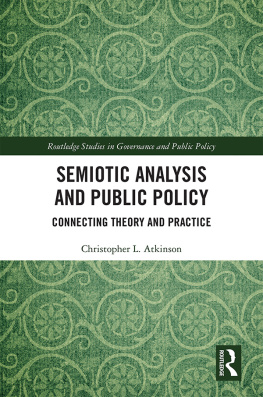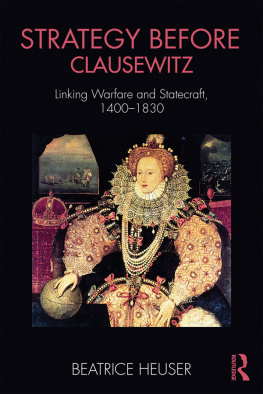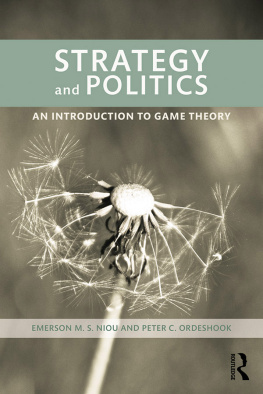ROUTLEDGE LIBRARY EDITIONS: SECURITY AND SOCIETY
Volume 1
SOCIAL ORDER AND THE GENERAL THEORY OF STRATEGY
SOCIAL ORDER AND THE GENERAL THEORY OF STRATEGY
Alexander Atkinson
First published in 1981 by Routledge & Kegan Paul Ltd
This edition first published in 2021
by Routledge
2 Park Square, Milton Park, Abingdon, Oxon OX14 4RN
and by Routledge
52 Vanderbilt Avenue, New York, NY 10017
Routledge is an imprint of the Taylor & Francis Group, an informa business
1981 Alexander Atkinson
All rights reserved. No part of this book may be reprinted or reproduced or utilised in any form or by any electronic, mechanical, or other means, now known or hereafter invented, including photocopying and recording, or in any information storage or retrieval system, without permission in writing from the publishers.
Trademark notice: Product or corporate names may be trademarks or registered trademarks, and are used only for identification and explanation without intent to infringe.
British Library Cataloguing in Publication Data
A catalogue record for this book is available from the British Library
ISBN: 978-0-367-56733-0 (Set)
ISBN: 978-1-00-312078-0 (Set) (ebk)
ISBN: 978-0-367-60818-7 (Volume 1) (hbk)
ISBN: 978-1-00-310071-3 (Volume 1) (ebk)
Publishers Note
The publisher has gone to great lengths to ensure the quality of this reprint but points out that some imperfections in the original copies may be apparent.
Disclaimer
The publisher has made every effort to trace copyright holders and would welcome correspondence from those they have been unable to trace.
Social order and the general theory of strategy
Alexander Atkinson
London School of Economics
First published in 1981
by Routledge & Kegan Paul Ltd
39 Store Street,
London WC1E7DD,
9 Park Street,
Boston, Mass. 02108, USA and
Broadway House,
Newtown Road,
Henley-on- Thames,
Oxon RG9 1EN
Printed in Great Britain by
The Thetford Press Ltd, Thetford, Norfolk
Alexander Atkinson 1981
No part of this book may be reproduced in
any form without permission from the
publisher, except for the quotation of brief
passages in criticism
Library of Congress Cataloguing in Publication Data
Atkinson, Alexander, 1944-
Social order and the general theory of strategy.
Bibliography: P293
1. Strategy 2. Military policy 3. Guerilla warfare
I. Title
U162.A78 355.02 81-17906
ISBN0-7100-0907-0 AACR2
Contents
The academic and personal debts one accumulates in an endeavour such as this, particularly in the course of my travels twice to Stanford University, California, and Hong Kong to obtain Chinese language sources which, at the time of my research in the early 1970s were not available elsewhere, are really too numerous for me to recall.
The outstanding ones I should mention are due to the Hoover Institution, Stanford University for the generous assistance extended to me as a visiting scholar, and to the Universities Service Centre, Hong Kong. The latter, particularly, was a godsend as the only place students and scholars of China could go in the Far East in an atmosphere of relative freedom and feel they were in the next best environment to actually being there, Without the staff, translators and the many visiting scholars at the Centre wjho knew so much more about Chinese language, culture and history than I did, this whole project would have died long ago. Finally, I should not neglect the Chinese Cultural Research Institute, Toyo Bunko, in Tokyo, where my kind hosts spent too much of their time trying to fill in for my lack of Japanese.
Of individuals, two stand out for their interest and encouragement. The first is Shelford Bidwell, past editor of the Journal of the Royal United Services Institute for Defence Studies for taking an interest in and publishing , giving me the courage to press on when I did need it; the former chapter being extensively rewritten from Vol. 118 (March 1973) Journal and the latter appearing in Vol. 119 (March 1974) Journal. Second, Philip Windsor, my PhD supervisor at the London School of Economics, I thank for his uncanny ability to be waiting for me at the end of most conceptual avenues I thought so hard to negotiate. I should add my thanks to Peter Paret, Professor of History at Stanford University, for making a number of helpful comments on the finished manuscript, particularly on the discussion of methodology in the last chapter.
Many of the Chinese documents on problems of war, strategy and social order to be quoted have not been readily available, and even fewer have been translated. The translations quoted here, marked throughout with an asterisk (*), are by Mr Hs Hung-wen as commissioned by me in Hong Kong, November 1973-January 1974.
I should also mention, as regards the differences in English and American rules of style, that since some chapters were written at Stanford and others in London, I fear inconsistencies in style may remain. In addition, I have used the expression frequently throughout the text, along with a few similar expressions, the form and movement of armed power is conceived since this form and movement is to be regarded always as a single continuum, or in the case of similar expressions, a single entity.
The author and publishers wish to thank the following for permission to reprint the copyright material listed below:
The China Quarterly for Resolutions of the Tsunyi Conference, No. 40, October-December (1969), translated by Jerome Chen; Monthly Review Press for Fanshen: A Documentary of Revolution in a Chinese Village, copyright 1966 by William Hinton. Reprinted by permission of Monthly Review Press; Princeton University Press for excerpts from Carl von Clausewitz On War, ed. and transi, by Michael Howard and Peter Paret, Introductory Essays by Peter Paret, Michael Howard and Bernard Brodie; with a Commentary by Bernard Brodie (copyright 1976 by Princeton University Press), pp.75-637. Reprinted by permission of Princeton University Press; University of Washington Press for The Land Revolution in China 1930-1934: A Study of Documents (1969) edited and translated by Tso-liang Hsiao.
London 1980
In the nuclear age, is the theory of strategy to be left behind destitute by recent fashion that there is no strategy any more only crisis management [McNamara]? Are we now destined to believe that it is becoming clear that war is not a continuation of policy but a failure of policy [Rapoport]?
Western observers have almost entirely missed the larger and more general theoretical implications of a recent shift in assumptions underlying the theory of strategy, particularly into its poorly researched social dimensions. In this may be found new life for the notion of violence as an instrument of policy in the nuclear age that can here obtain the results which are otherwise unattainable. If the remarkable success of Maoist insurgent strategy in mainland China had failed to instruct, largely due to the formidable language and research difficulties, if the recent

